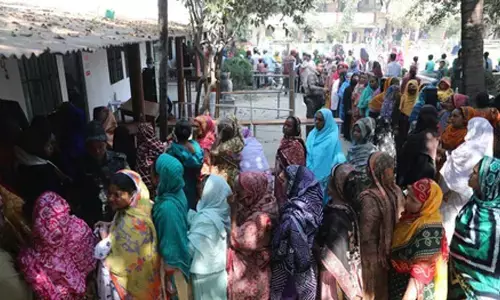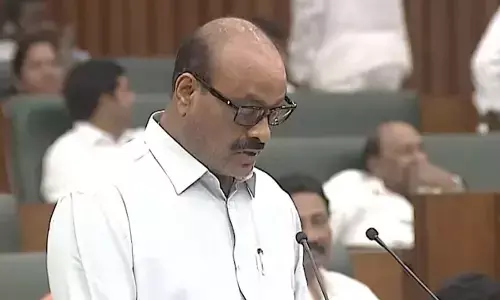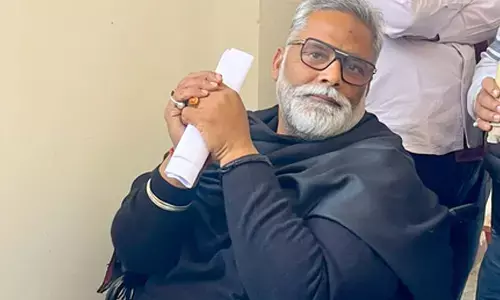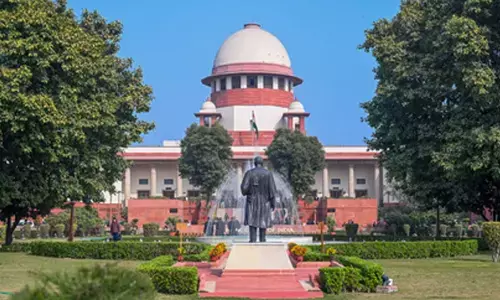Timely justice remains a distant dream in India

Lack of adequate number of judges being the main cause for judicial delay, the ongoing clash between the Executive and the Judiciary over judges’
Lack of adequate number of judges being the main cause for judicial delay, the ongoing clash between the Executive and the Judiciary over judges’ appointment cannot be watched passively by citizens who want speedy justice. Incidentally, time factor in deciding court cases is an indicator for assessment of proficiency of justice delivery system in a country
The procedure for appointment of judges has become a contentious issue between the government and the judiciary forcing the Prime Minister to come out with a conciliatory statement that there is no scope for any confrontation or tension with any constitutional institution. This soft statement is significant as the issue of delay in the execution of the recommendations of the judicial collegium for appointment of judges for over eight months is coming up for hearing in the Supreme Court shortly. CJI Thakur is reported to have told the Attorney General that “the Centre is attempting to bring the judiciary to a grinding halt by not appointing high court judges”.
Lack of adequate number of judges being the main cause for judicial delay, the ongoing clash between the Executive and the Judiciary over judges’ appointment cannot be watched passively by citizens who want speedy justice. Incidentally, time factor in deciding court cases is an indicator for assessment of proficiency of justice delivery system in a country.
The tussle between the Judiciary and the Executive over the collegium system for appointment of judges is going on ever since the system was introduced. It is further complicated by reported differences within the present collegiums leading to weakening of popular trust in the judicial system as a friend in need.
A senior sitting judge of the Supreme Court, Justice Chelameshwar, who is a member of the present collegium, has expressed dissatisfaction over the process for appointment of judges, particularly lack of transparency. His strong statement indicting the collegium system as “absolutely opaque and inaccessible both to public and history, barring occasional leaks” shows split within the judiciary as in political parties. It is reported that he also refrained from attending the collegium meeting.
It was an important meeting convened to decide on the draft Memorandum of Procedure (MoP) regarding appointment of judges prepared by the union government in response to the Supreme Court order in 2015. Its verdict then struck down the National Judicial Accountability Act (NJAC Act) passed by the government to replace the collegium system. The Act provided for a 6-member panel comprising CJI, two Supreme Court judges, Union Law Minister, and two eminent persons to appoint judges.
Relevant is the fact that the dissenting member of the collegium today was the lone dissenter in the 5-judge Constitution Bench which upheld the 20-years-old Collegium System in 2015 in which the government was given no role in appointing judges. Above all, he expressed a strong view that keeping the government away from the appointment process was “illogical and inconsistent with foundations of theory of democracy”.
Lack of unity among judges on this issue seems to be widening with more and more judges voicing their individual opinions for and against the collegium system. A retired judge of the Supreme Court, obviously on the basis of his experience, is reported to have described that the system has degenerated into a “give and take” policy and the members had not proved themselves to be “detached.” The citizens can only hope that this is exaggeration and pray that judiciary can get over this crisis without delay.
The issue involves a very important task of maintaining the independence of the judiciary and safeguarding the balance of power among the three principal organs of governance. Prolonged delay in resolving it will only add to the woes of litigants looking for justice.
People must be sick of hearing the oft quoted saying of the British PM, Gladstone (1809-98) that “justice delayed is justice denied”. Nobody but the litigants and the affected people seem to be anxious for speedy settlement of disputes and for speedy trials.
It is reported that total pendency in various courts is over 2.24 crore and about 475 judicial posts are vacant out of about 1,100. The National Judicial Data Grid shows that fresh cases filed in courts outnumber those disposed of in the same period. In August, 7.28 lakh cases were disposed of, but 7.7 lakh fresh cases were registered, which indicates the trend of increase in backlog. Consequently, courts may be tempted to shorten hearing and come to hasty conclusions.
One of the main causes for continuance and popularity of out-of-court settlements, caste panchayats, katta panchayats, and informal arbitration by village elders is the inordinate delay in deciding cases in law courts.
Prolonged dispute over the power of appointment will create suspicion over the independence of the judges in upholding law and justice. Selection of judges may be left to a panel comprising members from both the executive and the judiciary.
Dr S Saraswathi










